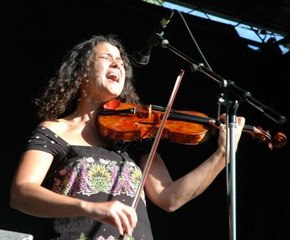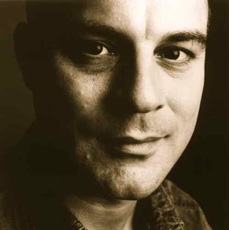The following are extended versions of the interviews I had with Toby Twining and Iva Bittova, who are both appearing at the 2011 Vital Vox Festival (Both will be performing on Night 2: Vocals + Strings)
First up, Toby Twining talks about his beginnings and inspiration as well as the new and current material.
CM: How did you go from roots in country-swing to rock to the other-worldly music you’ve been making for various instruments, including voices and chamber ensemble?
TT: This is a long story—I’ll attempt a Reader’s Digest version.
I grew up in Houston and my maternal grandparents were both pro musicians—grandad played guitar, pedal steel, string bass; grandmother played gospel piano like Liberace/Debussy mix. As a teenager, I played guitars, bass, and keys in rock bands. All the kids played Texas blues as well.
At age 16 I longed to expand my compositional palette and started listening to classical music. The European art music repertoire was almost entirely new to me. In addition to that, over the next 12 years or so, I learned some Jewish folk music, immersed myself in Early music, Ghanaian drumming, Ba Benzele vocal music, throat singing, improvisation at the piano for modern dance classes, the 20th century avant garde and studied composition with Ben Johnston (who didn’t teach me JI in my lessons, btw, but focussed on supporting my aspirations to compose and giving me a handle on organic form). While hanging around after graduation at the University of Illinois in Urbana, my friend Bill Brooks (now at York, UK) asked me to sing in a concert that featured Stimmung, Messiaen’s Cinq Rechant and Cage’s Song Books. Performing these works gave me a sense of terra incognita—the potential for extended vocal techniques with expansive structures—and I felt that all the mixed experience of my musical past coalesced finally in a vision for a new vocal sound. I’d like to think that the human voice can actually take a leading role in musical innovation again.
CM: Can you talk about the new pieces Toby Twining Music is performing at the show?
TT: About 12 years ago, Margaret Leng Tan commissioned me to write settings of poems and prose from Hesse’s Wandering, his sort of travel journal after WWI that included his watercolors. The work was originally for piano, narrator and tenor. Margaret and I put the project on the back burner eventually, in part because I couldn’t get enough pitches out of the piano.
I’ve begun to rework Wandering as bilingual, soprano duets for my ensemble (SSATBB, Vc) and can now do what I want with the harmony, which, in [Harry] Partch’s terms, is 13 limit otonal and utonal, but also modulates in ways that were unavailable to pre-digital musicians. The music is strikingly different from the earlier versions. We’ll premier Magic of Colors and Walk at Night, which feature Eileen Clark as soloist for the German and Eric Brenner for the English, Malina Rauschenfels playing cello and singing alto simultaneously, Avery Griffin and me on some inverted throat singing (fundamental moves while ‘monic ties over), and other timbral/rhythmic vocal effects that I can’t resist.
There’s a solo sonic poem/rap piece called O&E@theBeach, and a piece for solo cello called Schoenberg Dreaming–How I imagine he heard music in his sleep while evolving toward pantonality, moving around the frequency spectrum by interlocking interval cells comprised of pure intervals.
We’re also performing Yes! Yes! Yes! from our recent CD, Eurydice.
CM: The group sounded great at Bang On a Can (at WFC) when I was there volunteering–Do the different audiences of each venue affect the performances of the musicians?
TT: Thanks. Sure, the audience is one important factor for affecting our performances because of the informational loop that flows between people—even if it’s just body language and no one is talking, the loop is there. It affects singers enormously.
CM: I’ve been seeing quite a few things happening now with chamber musicians/soloists that have singing roles in works now. Do all of the members of Toby Twining Music sing?
TT: In the present configuration, yes. That’ll probably change with some future projects that include more strings and winds.
~~~~~~~~~~~~~~~
Czech violinist/vocalist Iva Bittova chatted very briefly about her inspiration and what she plans to perform.
CM: First of all, did you have any idea that you would be creating a very unique-sounding vocals-and-violin music? You are quite dynamic as a violinist alone, and then there’s your percussive vocal style combined with that.
IB: Yes, I would love to create spontaneously some new vibrations with my voice and violin. In my program is a lot of space for improvisation, it [just depends] on audience and acoustic space.
CM: You had put music aside for a time to be an actress in film. What was it that brought you back to the music world?
IB: As a musician I got more freedom to create myself and express my ideas of art. It is more difficult but same time very independent, which makes me happy.
CM: Will you be premiering any new pieces at the festival?
IB: Improvisation would be there as a new sound, also some songs, which I played just few times and always inspiration of every other performance coming stronger. It is quite long process and requires time to grow.
CM: Loved the piece you did with TwoSense last year–Will there be more commissioned works along those lines?
IB: Hopefully…
CM: The improvised work you do sounds so pure and meant-to-be. How long have you done that?
IB: I am on my way to raise my music from 1985. Still need more years to go.
2011 Vital Vox Festival
Sat, Nov 5th and Sun, Nov 6th, 8 PM
Roulette
509 Atlantic Ave (At the Corner of 3rd Ave)
Brooklyn, NY 11217
(917) 267-0363
info@vitalvoxfest.com
Vital Vox Festival.com
Official website for the festival
Toby Twining Music.com
Toby’s official website
Iva Bittova.com
Iva’s official website

